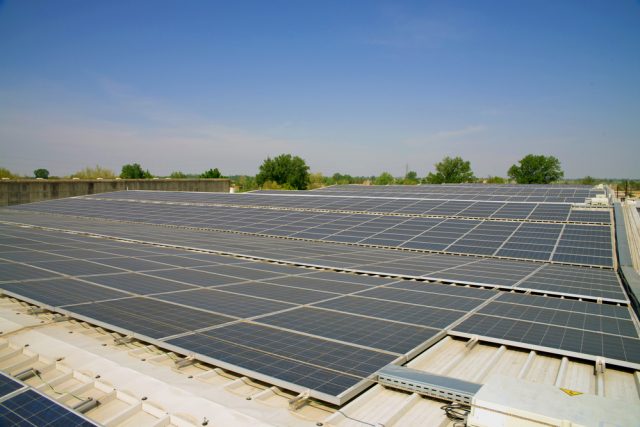Can solar panels be recycled?
Those interested in the potential of solar panel technology are undoubtedly concerned about protecting our planet’s fragile environment. One current issue of debate among environmentalists concerns the best way to recycle solar panels when they reach the end of their lifecycle.
Solar power is the most rapidly growing energy source in the world. In 2015, an estimated 500,000 solar panels were installed globally each day. However, the unintended consequence of this meteoric growth is an alarming waste management issue. What will happen to the millions of solar panels in use worldwide when they are out of service?

Solar cells on the roof of a factory
Few Solar Panel Recycling Options Are in Place
At the moment, most countries haven’t implemented standards for recycling solar panels – which means that, although it’s very possible to recycle old panels, there’s no consistency around the process.
The majority of solar panels come with a 25- to 30-year warranty, and in fact, many of the systems installed in the 1980s are still generating power to this day, so solar panel recycling hasn’t become very widespread yet. However, it is unrealistic to assume we will not eventually need to address ways to recycle decommissioned solar panels. We need to be practical about developing solutions before a crisis is upon us.
Planning for Our Future
Given the realistic lifespan of solar panels, we can predict a spike in solar panel disposal in the early 2030s. If solar growth forecasts are correct, we need to step up our recycling practices to keep their components out of landfills.

Solar panels contain heavy metals, such as cadmium and lead, which could leach into our groundwater supply if they are not recycled properly. Other components of solar panels include rare elements, such as gallium and indium, that do not exist on Earth in large quantities. Recycling these materials will help conserve our finite supplies of these limited resources.
The Complexity of Recycling Solar Panels
Recycling solar panels is complicated by the fact that they contain so many different types of materials. Panels are made of metals, such as lead, copper, gallium and cadmium; an aluminum frame; silicon solar cells; and synthetic material that encapsulates the silicon. Proper recycling involves collecting and disassembling old panels, physically separating and processing their various components and reusing elements such as silicon, glass and semiconductor materials.
Solar panel recycling has a tremendous environmental and economic benefit. A 2016 study by the International Renewable Energy Agency estimated the recyclable materials in old solar modules will be worth at least $15 billion in recoverable value by 2050. Of course, it seems natural to assume the growth of solar panel recycling will also lead to the creation of new, green jobs within the renewable energy industry.![]()
What Can We Learn From Europe?
The European Union’s Waste of Electrical and Electronic Equipment directive dictates solar panel disposal guidelines. However, Europe is the only place to have implemented specific standards for recycling solar panels. The rest of the world should look to Europe as a model for establishing criteria for the proper disposal of old or malfunctioning solar panels, creating global environmental and economic benefits.
As the cost of solar energy falls, solar panels will continue to realize their great potential as an environmentally friendly energy source. For a greener tomorrow, it is important to be proactive about discovering solutions for disposing solar waste today.




